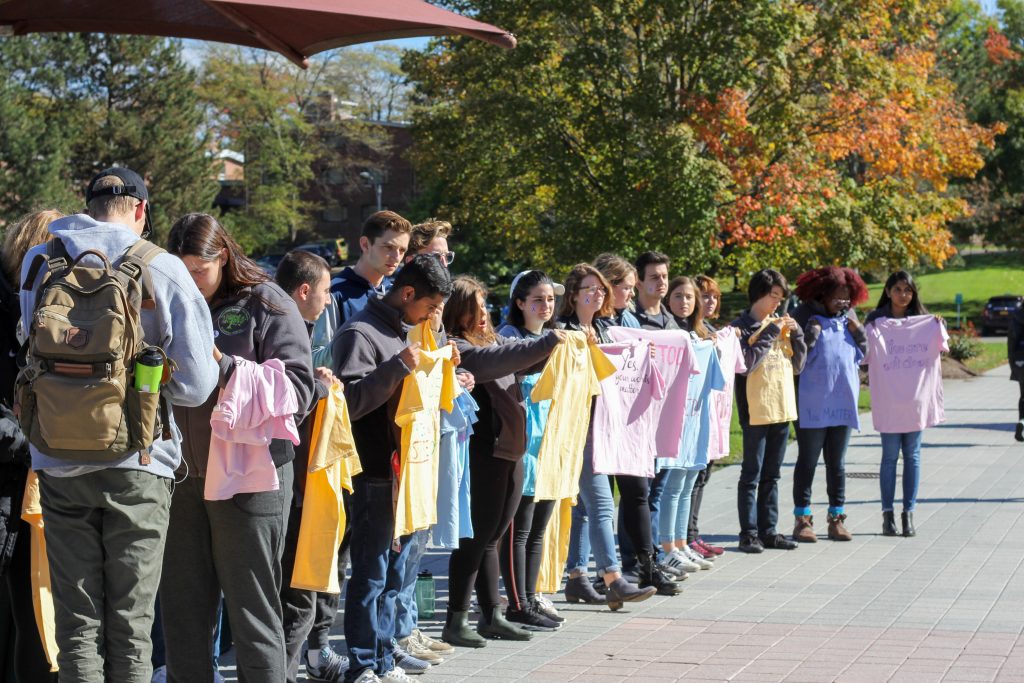
Clasping T-shirts of various colors and joining hands, Binghamton University students created a human clothesline on Tuesday to support victims and survivors of interpersonal violence as part of Binghamton University’s Health Promotion and Prevention Services’ (HPPS) Clothesline Project.
Hosted by 20:1 Sexual Assault Prevention Program, a national sexual assault prevention peer education program, the annual event allowed the campus community to write personalized messages on T-shirts, with each color representing support for victims of different types of violence: white, for people who have died as a result of violence; yellow, for survivors of physical assault and domestic violence; pink, for survivors of rape or sexual assault; blue, for survivors of incest or childhood sexual abuse; purple, for people attacked due to their sexual orientation or gender identity; and black, for people attacked for political reasons.
Later, participants held hands as they walked through the Marketplace, Lecture Hall, the Spine and the Peace Quad to advocate and raise awareness for victims of interpersonal violence.
According to Dara Raboy-Picciano, coordinator of interpersonal violence prevention for HPPS, this year’s event allowed people on campus to directly interact with each other and see the support that’s available to them.
“This year we decided to do a human clothesline that is mobile to really get out to the whole campus community how much we support survivors of interpersonal violence,” Raboy-Picciano said. “It’s really important that on every level, the University shows support to victims. It helps people, obviously to feel supported, but they’re more likely to report, they’re more likely to seek help, when there’s a whole atmosphere and culture on campus of warmth and believing victims.”
Renee Berkowitz, a senior double-majoring in psychology and anthropology, said she wrote “We believe you” on a pink T-shirt to raise awareness and support for survivors.
“I think it’s extremely important to support survivors of abuse and domestic violence, no matter their gender,” Berkowitz said. “Especially with the Brett Kavanaugh hearing, with that going on and him getting confirmed, I think it’s extremely important to believe survivors and hear what they have to say.”
The Clothesline Project was initially started by a group of women in 1990 and has since expanded to college campuses across the United States. It is always held during October, which is domestic violence awareness month. It’s founding was based on a statistic — during the Vietnam War, 58,000 soldiers died and concurrently 51,000 women were killed by the men who claimed to love them.
For Stacey-Ann Gordon, a Mental Health Outreach Peer Educator (M-HOPE) intern and a sophomore majoring in human development, having a dialogue about interpersonal violence is especially important after the events of last semester, when Haley Anderson, a senior nursing student at BU, was allegedly strangled by Orlando Tercero, her former partner.
“With what happened with Haley Anderson, the senior who died because of domestic violence, I feel like a lot of students aren’t really educated on what a healthy relationship is,” Gordon said. “And especially if they are in a domestic violence situation, they feel as if it’s their fault that if they get abused or attacked, it’s their fault and they can change the person. But you can’t. If anything, if you feel as if you’re in danger, you should get out. I feel like we just need to educate the whole campus that interpersonal violence is very real and we should bring light to it.”
The event also featured local organizations, including the Crime Victims Assistance Center (CVAC), which aims to enhance the community’s ability to prevent crime and respond to victims. According to Kelly Doyle, ’18, interpersonal violence educator at the CVAC, it is critical to inform students about the different types of violence and microaggressions people experience on a day-to-day basis.
“I think people might not realize that more people than they know are affected by crimes every single day,” Doyle said. “Even things like microaggressions like catcalling on the street — little things add up. Even if it’s not direct violence, it’s all around us.”
According to Doyle, there is also a spectrum from healthy to abusive relationships, and there can be subtle signs, or “purple flags,” that can potentially indicate a partner is an abuser or a manipulator.
“There are subtle signs which we’ve been referring to as purple flags because purple is the color for domestic violence awareness,” Doyle said. “We really want to spread awareness that it’s not just the direct physical abuse that people tend to think of. There’s really so much more and there’s definitely warning signs along the way that we want people to be aware of and pick up on.”
Other events held in honor of domestic violence awareness month included ‘Paint the Town Purple’ at the Peacemaker’s Stage in Downtown Binghamton on Oct. 5.


